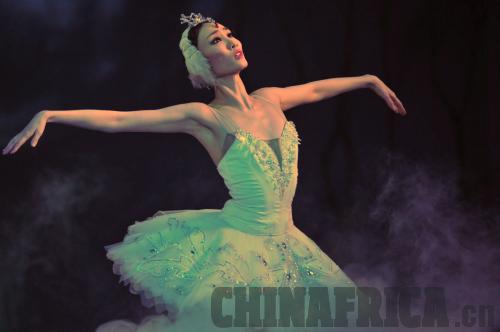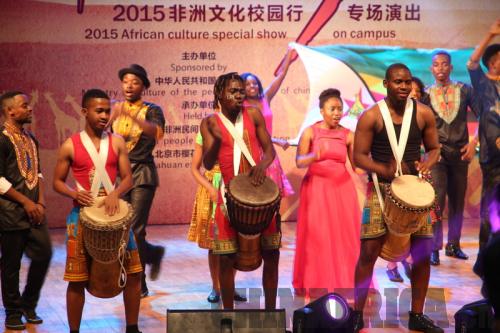| 
Principal ballerina Yu Chuanya performs in the jointly presented version of Swan Lake by Joburg Ballet of South Africa and Liaoning Ballet of China

2015 African Culture Special Show on Campus is held in a middle school in Beijing
Professional ballerina Yu Chuanya sets high standards for herself. After a recent long haul flight from Beijing to Johannesburg, the 25-year-old went straight into intensive rehearsals soon after landing, ignoring the effects of jet lag in pursuit of her craft. What drove her passion was the unique collaboration on the ballet classic Swan Lake, jointly presented by Joburg Ballet of South Africa and Liaoning Ballet of China.
Though the Chinese dancers had only five days to rehearse with their South African peers, the first gala performance thrilled a full house in Johannesburg. A highlight of the 2015 Year of China in South Africa events, the collaboration saw 20 performances that created a box-office record for Joburg Ballet, bringing in about $212,000 and witnessing an average attendance rate of over 87 percent.
Supported by China's Ministry of Culture and South Africa's Department of Arts and Culture, Swan Lake was a new initiative of the two ballet companies to jointly explore the commercial performance market in South Africa. It is a brand of innovative cooperation that augers well for future Sino-African cultural ties.
A matter of satisfaction
The year 2006 marked a milestone in the development of Sino-African cultural relations. The Beijing Summit of Forum on China-Africa Cooperation (FOCAC) that year established "a new type of strategic partnership" between China and Africa, attaching equal importance for the first time to cultural exchanges and mutual learning as to political trust and economic cooperation.
After eight years of progress in stepping up cultural interactions with African countries, China has made such brand programs as the China-Africa Cultural Cooperation Partnership Program, African Cultural Visitors Program, and China/Africa Culture in Focus a success.
"The Sino-African cultural exchanges and cooperation over the past years have shown the trend of increasingly diversified participants while focusing on cultural branding," said Song Yangqun, Director of African Affairs at the Bureau for External Cultural Relations of China's Ministry of Culture.
Data from the Ministry of Culture confirms the trend. From 2007 to 2009, China held three sessions of African Cultural Visitors Program to share cultural management experience. In 2012, the First Cultural Ministers' Forum of FOCAC was held in Beijing.
Nigerian Minister of Culture and Tourism Edem Duke, speaking on behalf of African delegates, expressed his satisfaction on the fruitful cultural exchanges in his address at the opening ceremony. Duke diverged from his drafted speech to say, off the cuff, "We have witnessed the exchanges strengthening mutual friendship and I believe [they] enhance the well-being of both Chinese and Africans."
The forum also passed the Beijing Statement, which aims to deepen Sino-African cultural cooperation. It was decided that in the next three years, 100 cultural institutions from each side would start working together under the China-Africa Cultural Cooperation Partnership Program. The program would be a platform to develop and collaborate on art professionals and help African nations develop cultural businesses. The two ballet companies joining forces for commercial performances in South Africa this year, according to observers, is an example of effective implementation of the cultural partnership program.
"Joint production seems natural as conditions are mature in South Africa for commercial performances in terms of theater conditions, ways of promotion, cast and audience resources," Song Yanqun told ChinAfrica. He added that not every African country however has the resources as South Africa does and it takes time to nurture the African market and find a suitable mode of operation. "Countries like Zimbabwe, Namibia, Mauritius and Seychelles have the potential to become the next market," he said.
The co-produced ballet is only one of the series of activities staged in the Year of China in South Africa, the first time an African country has hosted a Year of China. Different cultural activities centered on China, including Peking Opera shows, intangible cultural heritage exhibitions, symposiums and TV and film festivals have been staged as part of the event.
|